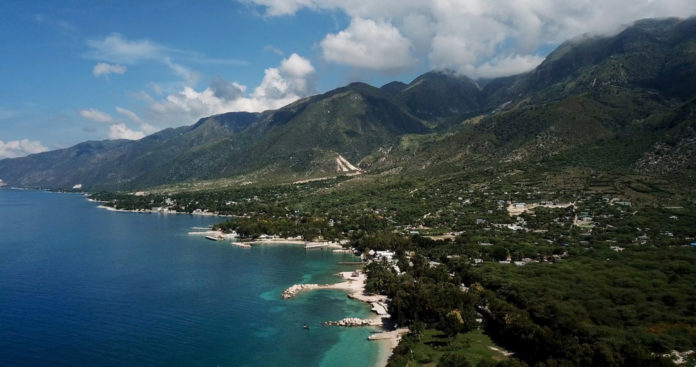On July 7, Haiti’s President Jovenel Moïse was assassinated, and his wife injured, in his home just outside of the capital city, Port-au-Prince. The Haitian authorities investigating the assassination are speculating that up to two dozen professional Colombian hitmen got the job done. The judge and two court clerks who are in charge of collecting evidence have gone into hiding after receiving numerous death threats, stating “there are great interests at play that are not interested in solving this case.” The assassination left a power vacuum as to who will hold on to the reins of this turbulent nation. Ariel Henry was appointed Haiti’s new prime minister on July 20 after a power struggle with interim prime minister Claude Joseph, who was urged to step down from his post by American diplomats.
So, why am I telling you all this? I have found that the media has done a dismal job reporting on everything that has happened in this Caribbean nation over these last few months and more people need to know about this humanitarian crisis. Students of all disciplines, especially Arts majors like political science, global development studies, and peace and conflict studies need to keep themselves in the loop about these violations of human rights. While The Cascade primarily covers issues relating to UFV and the Fraser Valley, we would be remiss if we didn’t cover the turmoil faced by the world’s first independent Black republic, which has a long history of outside intervention by the Canadian and U.S. militaries.
On August 14, Haiti was hit with a 7.2 magnitude earthquake, killing at least 2,200 people and leaving tens of thousands of people homeless. Haiti is still recovering from the devastating 2010 earthquake that killed more than 200,000 people and caused extensive damage to the country’s already weak infrastructure. Haiti’s geographic location ensures the perfect storm for natural disasters, as it sits on the fault line between the North American and Caribbean tectonic plates, making the country extremely susceptible to earthquakes, and they are in the direct path of tropical storms from the Atlantic hurricane season. The warming of our planet due to climate change also puts the nation at greater risk of floods, landslides, and droughts.
“Many of these families had not fully recovered from Hurricane Matthew. One of the women we talked to today was just so distraught because she had just gotten her home slowly rebuilt over the last five years back to where she was feeling very hopeful again, and to see it crumble within minutes,” said Paul Shetler Fast, Global Health Coordinator for MCC.
MCC’s relief efforts were the first to reach remote communities affected in the Southwest corner of Haiti, two weeks after the earthquake. Experts say that the slow roll of aid to the nation is due to political turmoil and the mistrust by donors, as billions of dollars of aid money given after the 2010 earthquake was grossly misspent.
August’s earthquake damaged about 70 per cent of all schools in southwest Haiti, putting 230,000 children at risk of dropping out. The lack of economic and education opportunities for Haiti’s youth is linked to the increasing proliferation of gang violence in the country. Approximately 19,000 Haitians have been displaced due to gang violence, causing citizens to describe their country as a “war zone.” Gangs are keeping crucial aid from entering neighborhoods and preventing essential services like Doctors without Borders from operating. The estimated 90 gangs in the country hold sophisticated weaponry and endless employment opportunities for citizens who are living hand-to-mouth due to an onslaught of crises.
On October 17, the gang known as 400 Mawozo kidnapped 17 missionaries from Christian Aid Ministries, including one Canadian and five children, who were abducted on their way to visit an orphanage. Kidnappings are a common tactic of gangs in gaining money and power. Christian Aid Ministries, an Anabaptist mission group whose former employee confessed to molesting Haitian boys, is one of the more than 100 Christian mission organizations currently working in Haiti. Why this group found it necessary to visit an orphanage in a country the U.S. Department of State issued a Level 4 travel advisory for back in June due to “kidnapping, crime, civil unrest, and COVID-19” is beyond me. The kidnappers demanded a ransom of USD $1 million per person for their release.
So, now that you know all of this, what can you do? If you have it within your means, donate to trusted organizations that are helping, such as Fonkoze, Hope for Haiti, World Central Kitchen, and Mercy Corps. You could shop at thrift stores like MCC and Project Aftershock who use their revenues to provide emergency aid and services to Haiti. You could share this article with others to increase awareness, and contact us to share your thoughts on the matter.
Image: Unsplash
Andrea Sadowski is working towards her BA in Global Development Studies, with a minor in anthropology and Mennonite studies. When she's not sitting in front of her computer, Andrea enjoys climbing mountains, sleeping outside, cooking delicious plant-based food, talking to animals, and dismantling the patriarchy.


